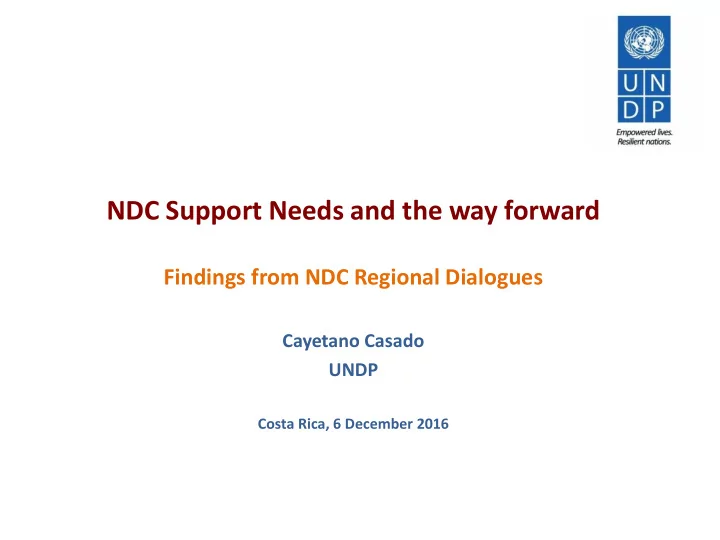

NDC Support Needs and the way forward Findings from NDC Regional Dialogues Cayetano Casado UNDP Costa Rica, 6 December 2016
2016 NDC Dialogues and preparation of LECB phase II program NDC support • Global NDC Workshop (Brussels, June) • LAC Regional Dialogue on NDCs (Costa Rica, July) • Africa Regional Dialogue on NDCs (Tunisia, September) • LECB II at 16 countries (LAC 6; Asia-Pacific 6; Africa: 4)
NDC Support needs Planning NDC Implementation Governance & Transparency Costing & Institutional & Monitoring Financing Arrangements
Needs Identified in Recent Dialogues (1) 1 NDC Implementation / Planning / Road maps – Disaggregating economy-wide targets across sectors – Prioritize – highlight (or Identify) new actions to achieve NDC goals – Understanding implications of inaction (impacts, risks, feasibility, etc.) – Developing implementation plan (timelines, roles, costs, needs, etc.) – Embedding NDC implementation planning and targets within development planning (mainstreaming CC, avoiding parallel processes, aligning w/ sectoral priorities, building on LEDS and NAPs, linking w/ mid-century strategies and SDGs) – Institutionalizing planning processes for future NDC rounds
Needs Identified in Recent Dialogues (2) 2 Institutionality / governance of the NDC – Building national awareness, engagement and support of climate action agreed at NDC – Governance. I nstitutional arrangements (roles, responsibilities, mechanisms of coordination among ministries/institutions, coordinating between political and technical levels, etc.) – Effectively engaging and increasing ownership of diverse stakeholders (relevant ministries, private sector, central banks, parliaments, etc.) – Assessing and building capacity of institutions (calculations, modeling, project/proposal development, technology options, etc.)
Needs Identified in Recent Dialogues (3) 3 Define cost / Financial strategies / Expenditure monitoring – Costing out prioritized CC measures, assessing climate finance needs – Mapping public expenditures, private investments (CPEIR – PCIEIR) – Understanding financing opportunities/ sources – Developing funding strategies (including conditional/unconditional) – Building capacity to access funds from different sources • Public : assessing domestic public budget expenditures • Private : addressing barriers, creating enabling environments, etc. • International : attracting bilateral support, applying to multilateral funds, developing proposals, etc. – Blending financing sources, considering role of carbon markets
Finance and technology needs in INDCs
Needs Identified in Recent Dialogues (4) 4 Monitoring and Transparency – Understanding transparency requirements (linking with national communications, BURs, etc.) – Developing and strengthening monitoring plans / MRV systems – Training public entities on MRV mechanisms – Building capacity for data collection /management, monitoring – Addressing data quality/gaps (updating inventories as needed) – Measuring sustainable development or non-GHG impacts of actions and linking this with monitoring/reporting for SDGs
UNDP’s climate change work 9
The Low Emissions Capacity Building Programme (LECB) • 2011-2017 • Objective: Build public and private sector capacities to design and track low emission development through national mitigation actions and the underlying measuring and monitoring systems • Supported countries: REGION COUNTRIES AFRICA DRC, Ghana, Kenya, Nigeria, Sierra Leone , Tanzania, Uganda, Zambia ASIA Bhutan, China, Indonesia, Lao PDR, Malaysia, Philippines, Samoa, Solomon Islands, Thailand, Vanuatu, Vietnam LAC Argentina, Barbados, Bolivia, Chile, Colombia, Costa Rica, Ecuador, El Salvador, Honduras, Mexico, Paraguay, Peru, St. Vincent & Grenadines, Suriname, Trinidad and Tobago ARAB STATES Egypt, Morocco, Lebanon EUROPE/CIS Moldova
LECB Phase II 2017-2018 Transitioning: continue “learning by doing” philosophy of capacity development NATIONAL GOVERNMENT DESIGNS PROJECT & IMPLEMENTS LESSONS More institutional strengthening NATIONAL EXPERTS SIT IN KEY GOVERNMENT MINISTRIES AND/OR Engage private sector & PROVIDE TRAINING investors earlier Increased south-south exchange Improve gender responsiveness TECHNICAL ASSISTANCE FROM INTERNATIONAL EXPERTS, Finance mechanisms UNDP & PARTNERS
The e-discussion on NDC Implementation UNDP, UNFCCC Secretariat, UNEP-DTU, and World Resources Institute https://www.unteamworks.org/NDCimplementation Currently developing joint guidance to be used by countries as they prepare for NDC implementation. Adaptation / Review and revising strategies / Awareness / Long-term planning / Governance / Implementation plan / financing, monitoring and reporting
Thank you Cayetano.casado@undp.org
Recommend
More recommend